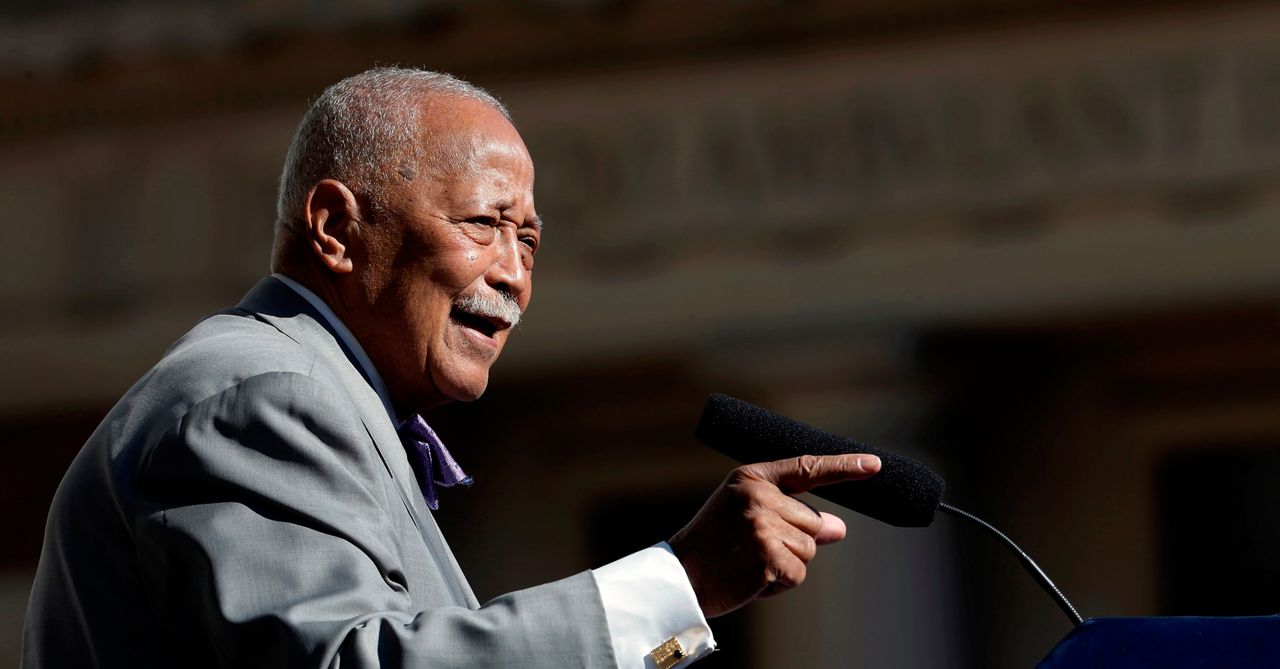
David Dinkins told the story often: One day, he and his wife Joyce drove by a construction site and passed one of her former boyfriends.
“See, if you married him, you would be the wife of a ditch digger,” Dinkins told her.
“No, if I married him he would be mayor and you would be the ditch digger.” Joyce said.
Dinkins always laughed. In a way, the story fit a certain image of Dinkins as an accidental mayor: a clubhouse politician who peaked at the right moment, just as the city, in a time of racial strife, was ready to elect its first Black mayor.
“You have to remember, I didn't start out wanting to become mayor,” Dinkins told me six years ago, on the 25th anniversary of his election. “John Kennedy and Bill Clinton, when they were young boys and were asked, 'Well, what are you going to be when you grow up?' 'I am going to be President.' That wasn't me."
But he did become mayor. I have always thought of Dinkins’ life as not just a story of personal achievement and Black empowerment, but also an American success story.
He was born in Trenton, the son of a barber and a domestic worker, and moved to Harlem with his mother during the Depression when his parents divorced. Dinkins joked they moved often, “when the rent was due.” His toys were hand-me-downs from the white families his mother and grandmother, also a domestic, worked for.
After high school, Dinkins joined the Marines, and called the experience one of the most rewarding of his life. His service allowed him to attend Howard University on the G.I. bill. He was a mathematics major, graduated cum laude, and then went to Brooklyn Law School.
His wife, Joyce, enabled Dinkins to get a toehold in Harlem politics through her father, a two-term state assemblyman. Dinkins was mentored by J. Raymond Jones, a legendary Democratic power broker. “I admired him because of his dedication and steady political development,” Jones later wrote.
Dinkins also benefited from his fierce friendships with three other promising young lawyers in Harlem: Percy Sutton, Basil Paterson and Charles Rangel. Together, the so-called Gang of Four helped each other up the ladder.
Dinkins’ climb was steady: state assemblyman, Board of Elections president, city clerk, and Manhattan borough president, with a stumble along the way (he bowed out of an appointment as deputy mayor after disclosing he failed to file tax returns from 1969 to 1972). The Rev. Jesse Jackson’s strong showing in New York’s presidential primary in 1988 suggested that a Black Democrat could defeat Mayor Ed Koch. Dinkins - by then the Manhattan borough president - was the logical choice to be that candidate in 1989.
He beat Koch in the primary and Rudy Giuliani in the general election - no small feat. His ascension to power made Dinkins a symbol of hope and change well before Barack Obama ever entered politics. Ten thousand people attended his inauguration.
Yet, in many ways, his was a mayoralty under siege. A punishing recession forced Dinkins to downsize his priorities. Crack, crime, AIDS and homelessness buffeted the city. And, by his own admission, he was too slow to stop rioting in Crown Heights and end a Black boycott of a Korean grocer in Brooklyn - creating an image of indecisiveness.
With the benefit of hindsight, his accomplishments have grown in importance: A deal with Disney that sparked the transformation of Times Square. A tax hike to hire 5,000 police officers, laying the foundation for the city’s historic reduction in crime. An agreement to build a new U.S. Tennis Center at no cost to the city, creating a certain cachet for New York as the host of the U.S. Tennis Open.
Dinkins ended up losing the mayoralty by the same slender margin that he had won it. The defeat left him bitter at the time. With the city overwhelmingly Democratic, he felt he should have won. He blamed racism.
In later years, though, the bitterness faded. Dinkins was a familiar figure around town, at press conferences, and municipal functions. New Yorkers clamored to take pictures with him. He always seemed happy to oblige.
When Dinkins died this week, I kept thinking about two of his speeches.
“I stand here before you today as the elected leader of the greatest city of a great nation, to which my ancestors were brought, chained and whipped in the hold of a slave ship," Dinkins said at his swearing in. It was a refrain he would repeat many times during his mayoralty.
Then there was his concession speech, the night he lost his re-election. "My friends, we have made history,” he said. “Nothing can ever take that away from us."
"story" - Google News
November 28, 2020 at 12:33AM
https://ift.tt/3o1K0Nf
Dinkins' Climb to the Top a Uniquely American Story - Spectrum News NY1
"story" - Google News
https://ift.tt/2YrOfIK
https://ift.tt/2xwebYA
Bagikan Berita Ini














0 Response to "Dinkins' Climb to the Top a Uniquely American Story - Spectrum News NY1"
Post a Comment